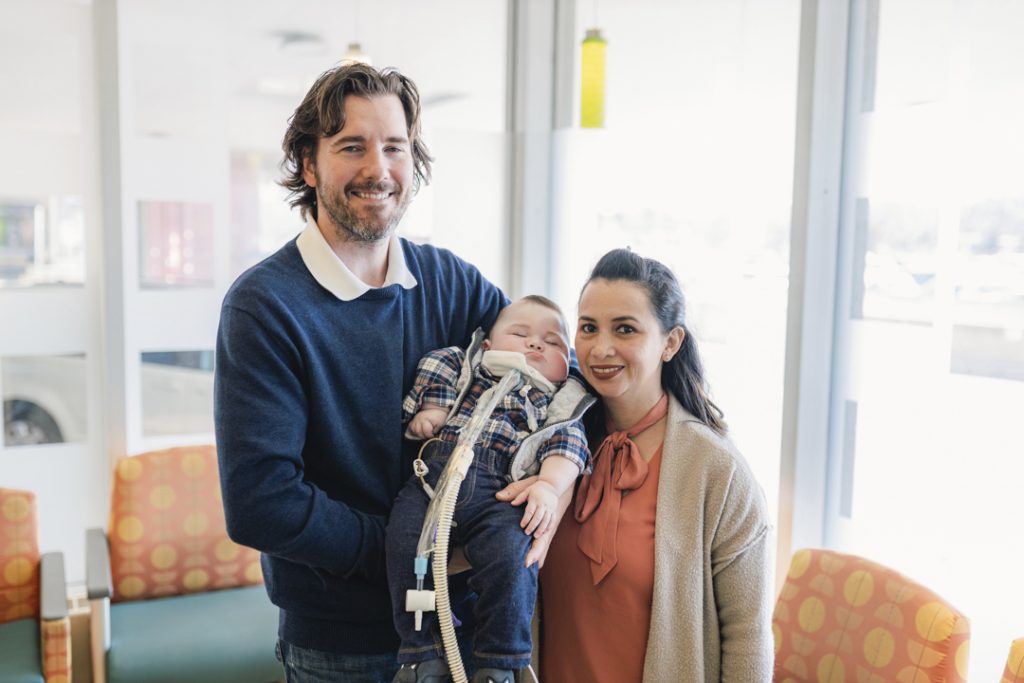
Complex care for Roberto means sleepless nights for his parents
Angela Cardona Soler and Jason Bowen’s lives changed forever when their son Roberto was born 13 months ago – but not just in the typical way a parent’s life is changed after the birth of their first child. Roberto was born extremely prematurely and requires 24/7 care because he is dependent on a tracheostomy (trach) and mechanical ventilator to breathe.
A tracheotomy is a surgical procedure which involves creating an opening in the neck in order to place a tube into a person’s windpipe below the vocal cords. This trach tube allows air to enter into the lungs. A mechanical ventilator is a machine that connects to the trach to help a person breathe.
Roberto spent the first 351 days of his life at McMaster Children’s Hospital (MCH), where his parents visited him every day. His mom showered in the hospital’s family room. She knew the café menu by memory. She even bought a mattress to sleep on.
Eventually, the Complex Care program and Pediatric Intensive Care Unit at MCH determined Roberto was medically ready to go home. But like many children with complex care needs, he requires homecare nursing and community support.
Children with complex care needs require specialized care at home
Children with complex care needs are not defined by specific syndromes, rather, by the level of their needs. A child can qualify as “medically complex” if they meet any of the following conditions:
- they depend on technology or machines to live;
- they are “fragile,” meaning they have a severe, life-threatening condition;
- they have a chronic condition, meaning the condition is long-lasting;
- or if they are being cared for by a variety of healthcare teams and services.
Many medically complex children, including those with trachs and mechanical ventilators, require trained pediatric nurses to help parents care for them 24 hours a day. There are currently over 160 patients in the Complex Care program at MCH. Half of these children are dependent on respiratory technology such as tracheostomy and ventilators.
There are many challenges with getting home care for complex care families. These challenges could result in more time in the hospital for the patient, even when they are prepared to go home.

Dr. Audrey Lim
“Our community continually sees shortages of trained pediatric homecare nurses, especially in more rural or remote parts of the province,” says MCH complex care pediatrician Dr. Audrey Lim. “These challenges in home support mean it’s more difficult to get these kids home and keep them safely at home, resulting in extended hospital stays. It also means families are left in extremely vulnerable situations where they don’t have the supports they need in the home.”
Preparing to go home
Roberto was born with many complications on October 8, 2019 at just 23 weeks and 6 days old. After just shy of a year in the hospital, he was ready to go home.
“When a family is ready for discharge, this means that 1) the child is medically ready, 2) the parents are trained and comfortable caring for the child with tracheostomy and mechanical ventilation at home and 3) there is support available in the community, such as trained pediatric nurses to help care for these patients,” says Lim.
Parents receive intensive training from the hospital’s complex care respiratory therapists to learn how to safely care for their child at home and how to deal with potentially dangerous situations should they arise.
In this training, families learn how to care for a trach, what to do in an emergency situation, how to troubleshoot ventilators, and other critical scenarios via simulation.
“They are running a mini ICU by themselves,” says Lim. “But they don’t have the extra nurses and respiratory therapists at home.”
Sometimes, they don’t have a nurse at all.

A test run
Roberto’s discharge date was delayed because there were no trained pediatric nurses in the community to care for him. The family was granted a “leave of absence” from the hospital for the weekend where they were able to go home. During this time, they were Roberto’s sole caregivers.
“These 48 hours really helped us understand we couldn’t leave the hospital without nursing. It’s impossible. It showed us how we would manage at home with him, and for the first time in one year, it gave us a tiny bit of privacy as a family,” says Cardona Soler. “By the time we had to return Roberto to the hospital, we were exhausted.”
The complex care team at MCH provided the family with a comprehensive care plan. They had to bring all their life-saving equipment home as if they were being discharged: two ventilators, a suction machine, oxygen tank, medications and supplies and a “who-to-call” list.
During this time , the family made a medical error that resulted in them calling poison control and the pediatric intensive care unit so the doctor could support them over the phone.
“I had really great support from everyone at McMaster.”
Good news
The family brought Roberto back to the hospital without knowing when they would receive home care.
“After one year of driving back and forth it becomes exhausting. You feel like you don’t have control of your life,” says Cardona Soler. “And then, I started praying. When you don’t know what to do, you hope and pray.”
Less than a week after their return to hospital, the family was discharged with community nursing available four nights per week. Since then, their nursing supports have fluctuated. Sometimes they have three nights of coverage, sometimes they have five.
“The expectation and guidelines are eyes on the child 24 hours a day – and we know parents need to sleep. Without homecare nursing, they stay up all night to look after their child,” says Lim. “What would ideally happen is seven nights of coverage.”
Cardona Soler had to stop working and her husband had to take a leave of absence from his job. She says she doesn’t know what she would do if she had more children to care for.
The responsibility is taxing on families experiencing something like this, especially when they don’t have family support close by to help with caretaking or household chores. This is the case for Cardona Soler, who moved to Canada twelve years ago. Her husband’s parents live about an hour away and received the training from MCH, too.
Advocacy efforts
MCH is participating in joint provincial advocacy efforts as part of the Children’ Health Coalition – along with other children’s hospitals and health organizations – with one particular focus: the urgent need to bolster funding and support for resources for children with complex care needs, says Bruce Squires, president of MCH.
“This need was already pronounced, but its acuity and urgency has been increased by the pandemic,” he says. “Closer to home, MCH is working closely to explore how partnerships with existing home and community care structures (including the Local Health Integration Networks and external home care provider agencies) can be enhanced to better meet the highly specialized needs of these patients and their families.”
In the meantime, Roberto’s parents are doing everything they can for him. He’s doing well, despite six surgeries and fourteen conditions.
The family is celebrating seven nights of nursing support for two weeks in a row. Cardona Soler says her son inspires her every day.
“We decided if Roberto will fight, we will fight next to him.”
